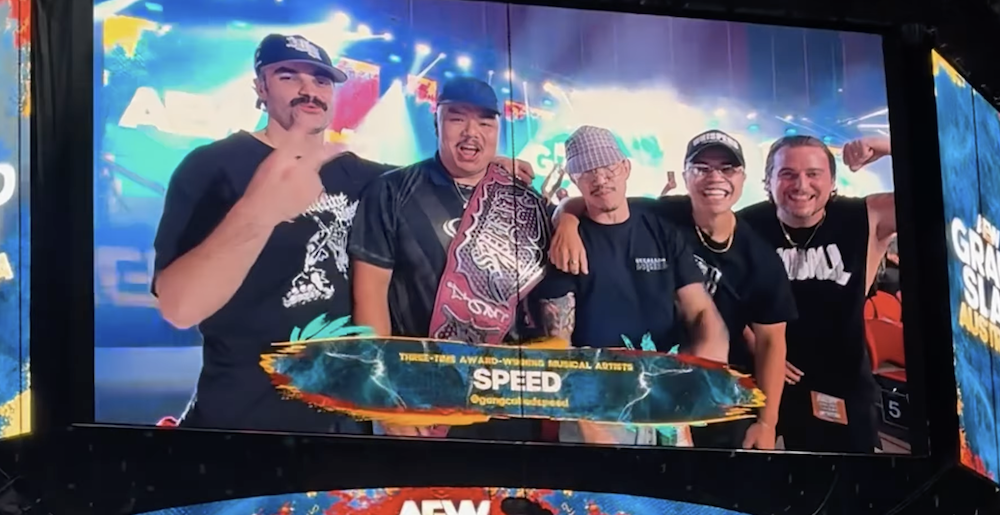Opening Up sees BLUNT talk to musicians about the opening track from each of their studio albums. Our next guest is Walter Schreifels, a veteran of punk and hardcore as well as alternative rock in the US. Across decades on the scene, he’s played in bands like Gorilla Biscuits, Youth Of Today and Rival Schools, as well as fronting Quicksand – whose fourth album, Distant Populations, arrived last month.
The sun is going down over the lower east side of Manhattan, as Schreifels settles in for an evening of interviews – coinciding with mid-morning in Australia, so a generally-agreeable middle ground for all involved. He’s in high spirits in the days following the release of Distant Populations – a lucky release not only in the sense that he was able to put new music out in the wake of a pandemic, but also defying superstition and releasing a record on Friday the 13th.
“I didn’t even realise that!” says Schreifels with a laugh. “I guess sometimes you’re presented with a chance to shift the paradigm on Friday the 13th, and without knowing, we must’ve taken it.”
Schreifels is a perfect candidate for Opening Up, having made well over a dozen records in almost as many guises across his 35-odd years as a musician. When you’re that well-versed in the art, you know a thing or two about how to make a record stick out once the needle drops.
“I don’t know if it’s like a big secret, but I think you want something that is gonna rile you up a little bit,” he says. “Coming from a hardcore background, you want something that has more of a call to arms kind of vibe. I think you can play against that effectively, and I think some bands really do. I like to come up with something a bit quick, and something that gives you some indication of what the rest of the record might be like – just in a condensed form. When it’s all said and done, you have your ideas about what the songs are going to be. When you’re listening back to them, though, they’ll tell you what they are – despite whatever your intention was.”
‘Fazer’ – Slip (1993)
It all started with the riff. That’s Schreifels’ story when it comes to the opening track of Quicksand’s debut LP, and he’s sticking to it. The drop-D riff hammers on the second fret to establish a key of E, while rhythmically it implements a duple time signature of 6/8 – already marking it as unique to the forthright, four-on-the-floor powerchords of Schreifels’ youth. “It’s kind of got this sea-shanty feel, y’know?” laugh Schreifels when discussing ‘Fazer”s structure.
“It’s more like a beer-drinking kind of rhythm, which is sort of odd for where we’re coming from. We were just kind of fucking around with it in a bunch of different ways before we landed on that. When we’re writing with the knowledge that ‘recording day is this day’, you got to get your act together. We found the strength in that opening riff, and I think the way it opens with those drums gets your attention right away.”
Schreifels was among many in the ’90s punk and hardcore scene that turned to the world of alt-rock – including members of Scream and the Germs, who ended up in lesser-known bands such as Nirvana and the Foo Fighters. Reflecting on both this transitional period and the genre semantics that came with it in the wake of the new decade, Schreifels truthfully sees little difference when you really break it down.
“This is probably generational, but I think with my crew, all the people that were into punk and hardcore were into stuff like AC/DC two years before,” he says. “We all loved Judas Priest and bands like that, y’know? You might give up the aesthetics of that when you’re a punk, but that’s still in your DNA. At that stage of the game in the ’90s, we were all a lot less uptight about inhabiting that. I mean, there was a time when your Led Zeppelins or your Black Sabbaths were not the monolithic monsters of rock. They were just cutting their teeth, doing something interesting and raw. That was scary to people, you know what I mean? I think it’s not so weird – especially nowadays, because you have punk parents! They probably raise children on only cool music, so it’s less and less unusual.”
‘Backward’ – Manic Compression (1995)
At one minute and 43 seconds, ‘Backward’ wastes precious little time. It charges out the gates with a blistering riff and booming drums, thrashing about its seasick 6/8 to the point where the entire thing threatens to bowl over unto itself. It’s a hell of a way to kick off Manic Compression, the band’s second LP. In Schreifels’ eyes, it was a matter of creating an equal and opposite reaction.
“It was probably dumb, but at the time I felt like Slip was too commercial,” he laughs. “I wanted to do something that was a little edgier, so maybe that’s like the message, from a lyrical standpoint. Also, I don’t want to say that song had an intentionally shitty sound, but it’s definitely a little bit more aggressive.”
The unease of the time signature – presented even faster than it was on ‘Fazer’ – was also by Schreifels’ design: “It’s not really a rhythm that anyone can dance to,” he says, “So it’s sort of like a bit of an anti-statement. I still think it’s a really good song. I think it especially works as that reaction to Slip, which was what was in my imagination at the time. It’s sort of like a fast kind of hardcore, just with a different take.”
Conversation turns to the notion of Second Album Syndrome that was so prevalent throughout the ’90s, and the paths bands would take in order to avoid it – whether you were offering up a careful retread of your debut with ultimately diminishing returns, like the Stone Roses, or tearing down everything you established initially, like Nirvana following their major-label debut with something as visceral and raw as In Utero.
“I think we were a part of that, and I think In Utero is a good example of what we were going for,” says Schreifels. “I think our approaches were similar: ‘We have this amazing formula, now let’s deconstruct that.’ During the course of making Manic Compression, the idea was definitely to make it a little bit more aggressive and abrasive.”
“Illuminant” – Interiors (2017)
It’s one thing to introduce your album, but it’s another entirely to completely reintroduce your band to an entirely new generation. In the 22 years between Manic Compression and Interiors, the members of Quicksand went their separate ways, convened within different folds (Schreifels in Rival Schools, bassist Sergio Vega in Deftones) and ultimately coming back together for what turned out to be a permanent reunion circa 2012.
As such, ‘Illuminant’ would serve as both the first new song fans from back in the day would hear, as well as potentially someone’s first-ever Quicksand song after discovering them through the process of reuniting. No pressure, right?
“You have a bit of identity crisis when you’re writing again after being away for so long,” says Schreifels. “You can try to create some sort of pastiche of your old self, but that’s just so limiting. It’s hard to get past a song or two with that formula. We had to represent ourselves now. We were just throwing stuff against the wall through jams, building our chemistry back, and that’s where the riff for ‘Illuminant’ came together.”
The hulking, snarl of the drop-D churn, backed by a steady, ‘When The Levee Breaks’-style drum beat, ended up setting the band on the right path – insofar as crafting Interiors‘ opening moments were concerned.
“Objectively, that’s what I wanted Quicksand to sound like now,” says Schreifels. “My mentality was: “If I played this for any Quicksand fan, they would immediately know it was us.’ We only had the riff, but I really worked on the song from there. I already knew that rest of it would start to fill in. I ended up being right – that song’s definitely got a lot a lot of weight in our history now. The annals of Quicksand, if you will. It’s an important one.”
“Inversion” – Distant Populations (2021)
After a world tour in support of Interiors – which lead the band to Australia for the first time, supporting Thursday – work began for what would become their fourth studio album, Distant Populations. Now officially a trio, following the departure of lead guitarist Tom Capone, the band were recalibrating in the present tense, and doing so with a newfound sense of confidence.
“We’d just done a whole tour as a three-piece, so we were much more certain about how that would sound going into this record,” says Schreifels. “I was covering all these guitar parts playing live, which was crazy at first, but I really think that we made it work. We felt pretty strong after the end of that tour – it felt like whatever the struggle, whatever the challenges, we got each other’s backs.”
Despite kicking off the record, ‘Inversion’ was actually created relatively late in the writing process for Distant Populations. As the song unveiled itself before the band, however, it became clear that it would serve as the record’s proverbial lynchpin.
“Sergio came in with the music, and it was, again, in a strange time signature,” Schreifels explains, calling back to the eschewing of standard 4/4 time in their album openers. “Sergio writes a lot in this sort of, like… three threes? I don’t know, I’m not that good with music theory, but that’s a lot of what he does. The song was kind of in this weird space, but I think ultimately we stretched it out so it had a bit more swing. I liked how kind of straightforward it was – we leaned toward the brevity, which was reminding me of something like Discharge. There was this sort of UK anarcho-punk vibe to it.”
It was that very vibe in question that inspired Schreifels to write the set of lyrics for ‘Inversion’, which he describes as “straightforward and aggressive” in their political convictions.
“There’s a band from New York called Nausea, who wrote from this very political standpoint,” Schreifels says. “It’s very humanist – getting into the weeds of all these different aspects of today’s politics that are so crazy. It’s about caring for your fellow man, being good and being kind, caring about the world and and all that. I think that song really summed up that key influence. Everything kind of shot off from the first lyric – which, of course, ended up being, ‘Distant populations’. I knew right away, from that line, that’s the concept for the whole record.”
“New Direction” – Start Today (Gorilla Biscuits, 1989)
Time for a bonus round – it would be a complete waste to have a legend like Walter Schreifels on the line and not talk about some of his other iconic album intros. Outside of Quicksand, arguably his most famous one comes with the trumpet fanfare signalling the start of the Gorilla Biscuits’ second album, Start Today. To this day, it stands as one of the most unique and memorable openers in the history of American hardcore – which Schreifels remains extremely proud of.
“I just thought it’d be cool!” he laughs when asked about the idea of the trumpets at the start of ‘New Direction’. “You know like in cartoons, where the King’s gonna come in?” He imitates a trumpet noise to explain what he means – “Da da da da da-da-daaaaa!” – before continuing: “I thought that, for a hardcore record, it would be a fun way to start it. It feels like there’s something sort of grand that everyone will react to. Then, when you’re changing the colour really quickly, it sets the tone for this song with a lot of heaviness to it.”
If you want to see the reaction ‘New Direction’ gets in full flight, watch this footage of them playing it (with real trumpets!) a couple of years ago. If you’re stagediving to a fanfare, you must be doing something right.
“With Gorilla Biscuits, everything just kind of felt like a real call-to-arms, y’know? We were very much in our own category at the time. I think a lot of the hardcore stuff at the time was maybe a little bit more… Well, I don’t want to say ‘serious’, because we were serious. Having said that… Like, we were called Gorilla Biscuits, y’know? We had a little more room to have a sense of humour about stuff. I thought the fanfare would be a good opener, and ultimately I was right!”
“Travel By Telephone” – United By Fate (Rival Schools, 2001)
Although not one of Rival Schools’ signature songs, like the thrashing pop of ‘Used For Glue’ or the wieldy alt-rock of ‘Everything Has Its Point’, there’s still a special place in Rival Schools’ canon for ‘Travel By Telephone’. As the opening number of their beloved debut United By Fate, it sets the scene and throws listeners right into the fray – and it still sounds as fresh and exciting now as it did 20 years ago.
“It’s like an alarm clock, the way it comes it with those snare hits,” says Schreifels. “That one kind of came later in the piece, when it just really didn’t feel like we had an opener for the record. When we landed on that intro, it was so exciting – it really felt like a get-up-and-go moment.”
Schreifels also points out an easter egg in the opening moments of the song, which you may only be able to pick up from a proper listen with headphones: “Right at the start, there’s me just screaming,” he says. “At that point, I was so frustrated with my voice. I wasn’t hitting the notes I wanted to in the booth, and I was just wanting to let off steam. It’s a very real scream, and I think that that gives the song a special secret sauce. The song is a good preview to the rest of the album, too. I think it really, in a more concise way, is an inviting first statement on it.”
“Flame Still Burns” – We’re Not In This Alone (Youth Of Today, 1988)
For our final record in the bonus round, we kick off with two words: “WE’RE BACK!” In tandem with playing in Gorilla Biscuits, Schreifels also found himself as part of the straight-edge hardcore crew Youth Of Today, serving as their bass player. He was recruited in 1987, just as the band’s lineup was reaching a point of instability. And with drummer Sammy Siegler in tow, there was now a solid formation for the band to proceed with.
“We had split up for a minute, although it’s hard to really remember all the circumstances of it,” says Schreifels. Fair enough, too – it was a literal lifetime ago. “Anyway, we’d broken up for a minute, and then we decided to make this record. It’s funny: we were talking about ‘New Direction’ before, and We’re Not In This Alone came out not long before Start Today. And I definitely kind of aped ‘Flame Still Burns’ a little bit on ‘New Direction’. I don’t know if anyone would notice, but it’s all in that opening guitar.”
He once again replicates the sound with his mouth to explain: “It’s kind of like, DUGGA-DOWWWW versus DOWWWWW. It kind of has announcement feel too, y’know? ‘We’re back!’ There’s something there about that announcement that is so fucking powerful.”
Schreifels feels a little more comfortable throwing some additional praise onto this one, considering he didn’t write the song. Classic, right? One of the most revered figures in the history, of both hardcore and alternative rock, and he’s out here bigging up his friends first and foremost. “Ray Kappo wrote it, and I always thought it was great,” he says.
“It’s a fucking amazing song. It’s so good, and the lyrics are so fucking awesome. That’s easily one of my favourites that Ray wrote. It’s really fantastic.”













